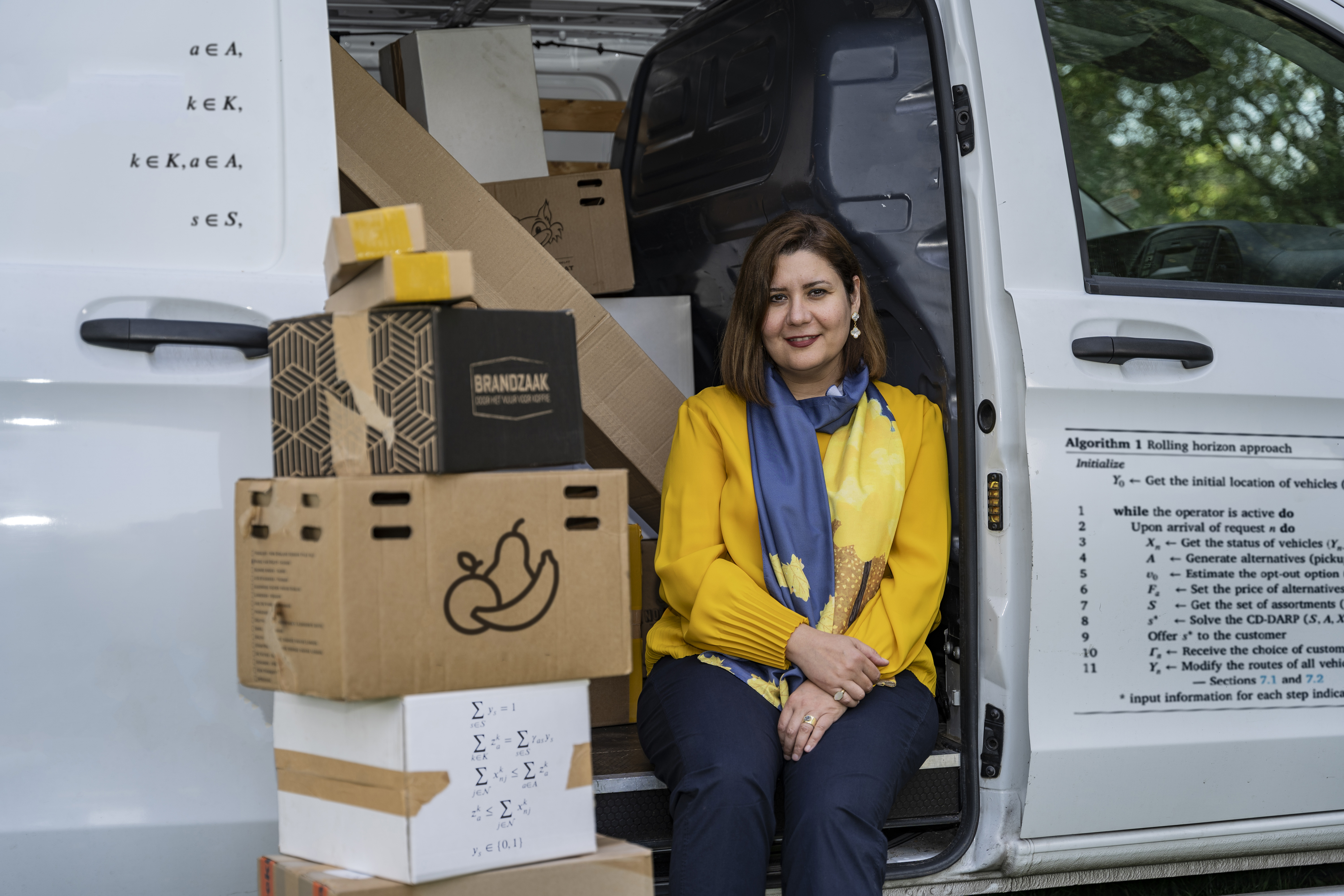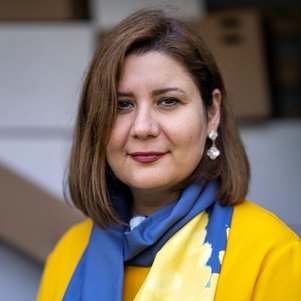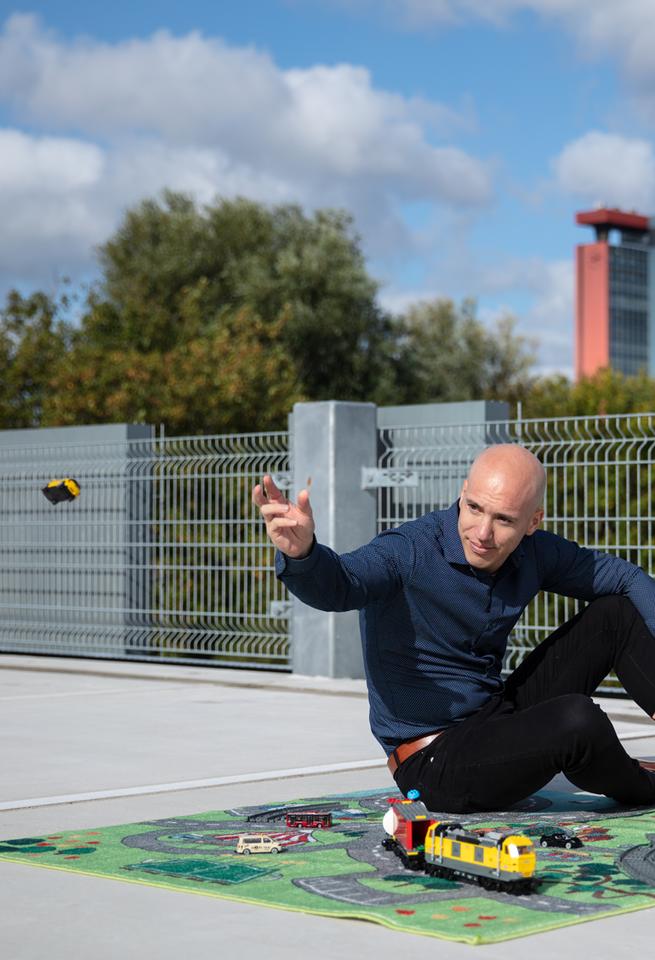Urban transport systems are a complex puzzle of supply and demand interactions, limited resources, and uncertain circumstances. Shadi Sharif Azadeh, associate professor in Transport and Planning at TU Delft, develops mathematical models and algorithms for last mile delivery services such as electric buses, meal delivery and ride sharing. Her goal is to make these services more efficient – in cost, environmental impact, you name it.
“Mathematics is like a language, an alphabet,” Sharif Azadeh says. “You can use it to write abstract poetry or something that resonates with the majority of the population.” Having a passion for both mathematics and for solving actual and tangible problems, she chose transportation science as her main field of research. “It provides many opportunities to conduct impactful research that can hopefully improve citizens’ quality of life,” she says. Next to minimising costs, the goal of optimisation can for example be to minimise CO2-emissions or to maximise the service level, social benefits, or efficiency of spatial usage in dense public urban areas. “Some of these goals have become especially important given the current challenges that climate change has brought to our daily lives.”
Notoriously difficult
Transport problems are notoriously difficult to solve as they are network problems where many factors are interconnected and can influence one another. Take meal delivery, for example. Sharif Azadeh: “A request on the website needs to be translated into an assortment (a menu if you will) that not only considers the customer’s preferences, but also the restaurants in the vicinity of the customer is located, the type of cuisine that was requested, the availability of riders in the neighbourhood, the price the customer is willing to pay, and the profit the platform, the restaurant and the rider want to make.”
Add uncertainty to the mix – in meal ready time or rider delivery time, for example – and it becomes obvious that smart and efficient algorithms are needed to find a feasible solution in a limited amount of time. While working on these problems Sharif Azadeh continually develops new mathematical models and algorithms to explicitly incorporate the behavioural components into operational decisions as yet another source of uncertainty. “I find it extremely rewarding to be able to tackle relevant problems from a scientific perspective.”
(Un)wanted transparency
Companies sure like to benefit from what universities in general, and Sharif Azadeh in particular, have to offer in terms of better solutions for their problems. But they also want to protect their data and intellectual properties to protect themselves in a competitive market. “For me, however, growth comes from knowledge sharing,” she says. “It is important to disseminate results, models and algorithms through reports, pedagogical short videos, publications, and teaching. This way, one can get feedback from peers to improve the methods, and collectively make a positive impact on society.”
It takes quite an effort to bridge this gap in desired transparency. What helps is that Sharif Azadeh finds collaborations between academia and industrial partners very well defined and facilitated at TU Delft. “It is very organic to collaborate with industry, with government entities, with international partners,” she says. “It is deeply rooted in the research culture, so you don’t need to justify or push for it. And Open Science is being strongly promoted for all the right reasons.”
Trust building
And then there are the negotiations with prospective industrial collaborators. This always starts with trust-building which, according to Sharif Azadeh, involves a lot of human relations and zero mathematics. “It certainly helps that we, at university, are problem-driven and not money-driven. But other than that, it is all about soft skills that we simply have not been trained for, and that we need to develop over time through experience.”
Her highest priority in these negotiations is to make sure that her PhD students and postdocs will have sufficient resources available to reach meaningful results. And to reach that goal, she takes her time to really get to know the party across the table. “I need to understand their needs and the potential conflicts of interest, and have a plan A to Z ready to address these,” she says. “When it comes to Open Science, for example, I do not need their exact data, such as sociodemographic information of the riders or passengers when it comes to ride-sharing systems, or the popularity of certain restaurants and meals for meal delivery services. If I know what the actual data looks like, I can generate my own and publish simulated data.” She also makes sure not to overpromise, to set realistic expectations.
Stepping-stone
Having been blessed with great mentors herself, Sharif Azadeh sees it as part of her mission to elevate her students. Not only scientifically, but also in establishing fruitful collaborations that are true to their own values, including Open Science. “Some students have a knack for it, needing only little guidance,” she says. “Others may need to start from scratch. Often, asking them to present their work to a company can serve as a stepping-stone.”
She doesn’t offer unsolicited advice, but she does let them know that developing these soft skills is a worthwhile investment. “The intentions, objectives and promised solutions when starting collaborations need to come from an honest, well-thought through and genuine place. If they do, they will find their way.”
Open Science at TU Delft
Open Science is an important way to spread TU Delft’s mission to deliver Science to Society. With Open Science we wish to make scientific knowledge accessible, free of charge to all users and online. In this way new ideas spread faster and wider which in turn lead to new research. We support our researchers in doing all that is necessary to be part of Open Science. Read more about the Open Science programme at TU Delft.



![[Translate to English:] [Translate to English:]](https://filelist.tudelft.nl/_processed_/6/e/csm_NielsvanOort-Het%20ov%20op%20het%20juiste%20spoor%20zetten_57a352c066.png)

![[Translate to English:] [Translate to English:]](https://filelist.tudelft.nl/_processed_/a/5/csm_boven_stationvoorwindows_aaa160a13b.jpg)